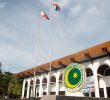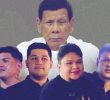What are the issues do you think should be on the table during the campaign but are not being discussed?
Impeachment was waffled about as a commitment of the opposition; and a serious discussion of the economy and what should be the policies for both sides, didn’t take place; human rights should have been central to the campaign but wasn’t; constitutional change was avoided as a topic, too.
What do you think is the administration’s strongest points, and the opposition’s?
The administration has a keen grasp of the importance of logistics and the propaganda value of appearing willing to win at all costs. It’s more focused on consistently putting forward a message that appeals to its base of supporters (the business and middle classes) and causing mischief among its foes. It’s fundamental premise is, whatever it does, the capacity of the public to express and act on its outrage is non-existence.
The opposition has the sympathy of half the electorate behind it, but seems to be running the campaign like a presidential campaign when no single candidate is running for national leadership: two major strategic errors were made, for example: much time was spent bickering over whether to print sample ballots, and second, the ads originally didn’t even feature the names of the candidates.
The fundamental premise of the opposition is that most Filipinos intensely dislike the President, but it still assumes the public will do something about that dislike, to the extent of voting — and that’s proving to be a stretch.
The administration has made it clear it has some sort of even hazy gameplan past election day; the opposition probably hasn’t even fully discussed what it will do after election day.
What would swing the polls? The middle class? The Left? The Right?
The Left, in announcing support for a mixed bag of senatorial candidates from the admin and opposition, has blunted its own ability to appear as a crucial block of votes. Its support will not be credited in terms of winning administration candidates — if they win, the Palace already says it will be due to local machinery, period. The Left will be blamed for the defeat of some opposition candidates, the blame coming from the Palace or members of the opposition themselves. Whether the Left can crucially mobilize votes on the ground, then, it doesn’t matter: they won’t get credit for it.
The middle class, in my view, has decided to boycott this election. They will go on vacation and enjoy the three-day weekend the president proclaimed for election day. Some of them will be involved in the quick counts and it is here that they will matter: they won’t matter in terms of votes, but will be crucial to the determination of whether the election was acceptable or not. The trouble could start if middle class volunteers discover, and point out, and object to, widespread fraud.
The Right is trying to prove it can knock out the Left but won’t succeed in doing so, not least because they’ll win some races through such obvious fraud, that it will enhance the public image of the Left. Neither can the Right quite manage media, and media is aroused enough, I suspect, to do a more comprehensive job of reporting and analyzing the conduct of the coming elections.
Finally, what is your sense of how Filipinos regard or appreciate the elections? Is this something important to them? Do they even care? Or have they become jaded?
My sense, and it’s only based on anecdotal evidence, is that this election is a major non-event. This doesn’t mean people haven’t taken sides, many have. But many more regard their partisan positions as irrelevant to the outcome. There also seems to be a general dissatisfaction with the national candidates. Not one has sparked excitement on a nationwide scale. (davaotoday.com)
2007 Elections









